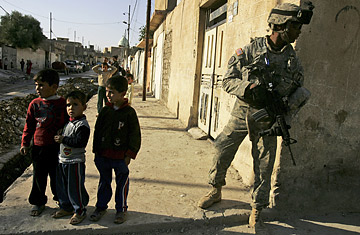
A soldier patrols a Mosul neighborhood, Iraq, on Monday, Nov. 17, 2008.
The Pentagon, after pushing for nearly a year for new rules governing the presence of U.S. troops in Iraq, is already back-pedaling. On the one hand, the agreement between the Bush Administration and the Iraqi cabinet — which still requires a potentially contentious vote of approval by the Iraqi parliament — simply codifies a U.S. redeployment already in the making. But the agreement's hard deadline for the removal of all U.S. troops by the end of 2011 represent a significant retreat for a Bush Administration that has long opposed setting a timetable for withdrawal. And it also poses a challenge for the U.S. military. Despite the agreement on a timetable for withdrawal, Joint Chiefs of Staff Chairman Admiral Mike Mullen, on Monday stressed he still wants U.S. troops withdrawn only when security conditions warrant it.
Under the status of forces agreement (SOFA) approved by Washington and the Iraqi cabinet, U.S. troop withdrawals will accelerate in the months ahead until all of the 150,000 U.S. troops now in Iraq will will be gone by New Year's Day 2012, leaving behind only a Marine guard unit of the type that protects U.S. embassies all over the world. Like kids getting set to take a roller coaster ride, the U.S. military is about to forfeit a lot of control over their fate in Iraq in the next three years. (See pictures of five years of U.S. troops in Iraq)
Speaking from Baghdad on Monday, Army Colonel John Hort of the 4th Infantry Division's 3rd Brigade Combat Team, said that the SOFA simply recognizes what is already happening inside Iraq. "We're kind of already moving in that direction — even prior to the SOFA — with the Iraqi army taking more and more responsibility, more and more of the lead, particularly the targeting of the bad people," Hort told Pentagon reporters in a video press conference. "So I don't see a significant change."
Admiral Mullen said Monday that he believes sufficient Iraqi forces will be trained by 2012 to assume responsibility for all of Iraq's security. While most of Iraq is now under the control of the Iraqi military, Baghdad and the northern city of Mosul remain under U.S. control. Turning the capital over to Iraqi security forces "will be a big challenge," Mullen said, and "we continue to be in a pretty tough fight up in Mosul."
The SOFA deal, which creates a legal basis for foreign forces to remain in Iraq beyond the December 31 deadline when the current U.N. mandate expires, not only sets a three-year deadline for U.S. troops to leave Iraq; it also requires that they leave Iraq's cities by June 30 of next year. The troops would redeploy to bases in the countryside, from which they could be called into action to support Iraqi security forces, as they currently do across much of Iraq. The SOFA also gives Iraq expanded legal jurisdiction when serious crimes are committed by U.S. troops who are off-base and off-duty — a rare circumstance for American troops in Iraq. The U.S. has also agreed not to attack Iraq's neighbors from inside Iraq — a key provision in persuading the many allies of Iran in the Iraqi government to support the agreement — and to refrain from searching Iraqi homes or detaining Iraqis without their government's approval.
Hort said some of his forces in Baghdad would "probably have to push more out towards the perimeter of the city, but I think that we can work through all of that." Still, Pentagon officials continue to express concern about the ability of the Iraqi military to keep the peace as the Americans pull out. Deep historical animosities among Shi'ite, Sunni and Kurdish groups remain, and local troops loyal to a specific sect won't be as capable of defusing tensions, U.S. officials fear. But Hort said that the Iraqi military "has got a tremendous amount of confidence in themselves, and is doing more and more each and every day that we work with them."
The election of Barack Obama was one of the factors that pushed the SOFA process along, Pentagon officials say. The President-elect had proposed on the campaign trail to withdraw U.S. combat forces from Iraq within 16 months of taking office, a position closer to the Iraqi government's than to that taken by the Bush Administration. The intra-Iraqi squabbling over the pact, partly fueled by Iran's concerns, evaporated following Obama's election two weeks ago. "I am hopeful that conditions will continue to improve, so we can continue" to withdraw U.S. troops, Mullen said. But if ordered to pull out despite poor conditions — a possibility many Pentagon officials fear in an Obama Administration — Mullen said he would obey such a command. Mullen added that it's "theoretically possible" that a new agreement allowing U.S. troops in Iraq post-2011 might be struck if conditions deteriorate.
The agreement is in part due to the success that Army General David Petraeus won with his surge and the retooled deployment strategy he spent the last 18 months implementing across Iraq. Violence in the nearly six-year war has ebbed to the point where Iraqi nationalism and a desire to exercise sovereignty have finally trumped Iraqi concerns over bloodshed and sectarian strife.
